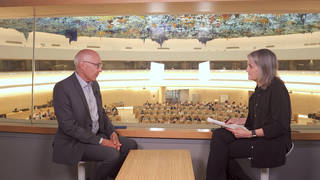
Guests
- Margarida Jorgeco-executive director of Health Care for America Now and Health Care for America Now Education Fund.
- Monica Simpsonexecutive director of SisterSong, a women of color reproductive justice collective.
Republicans have moved one step closer to repealing Obamacare after the House narrowly approved legislation Thursday that would result in tens of millions of people losing health insurance while providing a massive tax break to the rich. The future of the bill remains in doubt as Republican senators have vowed to write their own healthcare bill. Most major medical organizations and the AARP warned the bill will cause serious harm to patients and drive up the cost of healthcare. The Congressional Budget Office was not given enough time to “score” the legislation—meaning the House voted on the bill without knowing its projected impact. The bill was also opposed by almost every sector in the healthcare industry, including hospitals, doctors, health insurers and consumer groups. It puts a cap on federal spending per person—including seniors and children—under Medicaid and blocks Medicaid funds going to reimburse Planned Parenthood for providing preventive care to women. We speak with Margarida Jorge, co-executive director of Health Care for America Now and Health Care for America Now Education Fund, and Monica Simpson, executive director of SisterSong, a women of color reproductive health collective.
Transcript
AMY GOODMAN: Republicans in Washington have moved one step closer to repealing Obamacare. On Thursday, the House narrowly approved legislation that would result in tens of millions of people losing health insurance while providing a massive tax break to the rich.
SPEAKER PRO TEMPORE: The ayes are 217. The nays are 213. The bill is passed. And without objection, the motion to reconsider is laid upon the table.
AMY GOODMAN: However, the future of the bill remains in doubt as Republican senators have vowed to write their own healthcare bill instead of taking up the House bill. Shortly after the vote, President Trump hosted Republican lawmakers at the White House Rose Garden for a celebration.
PRESIDENT DONALD TRUMP: This is a great plan. I actually think it will get even better. And this is—make no mistake, this is a repeal and a replace of Obamacare. Make no mistake about it. Make no mistake.
AMY GOODMAN: While President Trump praised the bill, most major medical organizations and the AARP warned the bill will cause serious harm to patients and drive up the cost of healthcare. The Congressional Budget Office was not given enough time to “score” the legislation, meaning the House voted on the bill without knowing its projected impact. The CBO projected 24 million people would lose health insurance under an earlier version of the Republican bill. The bill was opposed by almost every sector in the healthcare industry, including hospitals, doctors, health insurers and consumer groups.
Critics of the bill faulted numerous provisions. Under the new bill, health insurance companies would be allowed to charge customers with pre-existing conditions as much as they want. The list of pre-existing conditions include rape, sexual assault, postpartum depression, cesarean sections and surviving domestic violence. It would roll back the expansion of Medicaid and cut Medicaid by $880 billion over 10 years. The bill also puts a cap on federal spending per person, including seniors and children, under Medicaid. The bill also blocks Medicaid funds going to reimburse Planned Parenthood for providing preventive care to women.
We’re joined now by two guests. In Washington, D.C., Margarida Jorge is with us, co-executive director of Health Care for America Now and Health Care for America Now Education Fund. And here in Atlanta, Monica Simpson is with us, executive director of SisterSong, a women of color reproductive health collective.
We welcome you both to Democracy Now! We’re going to begin with Margarida Jorge in Washington. Can you explain what it is that the Republicans passed in the House?
MARGARIDA JORGE: Well, you’ve covered a lot of it. You know, I could continue and say a lot of even worse things about it, but let me say just a couple of things. One thing is that the Affordable Care Act was largely a bill that created a set of rules for insurance companies. And the rules for these insurance companies were critical, because, if you remember before the Affordable Care Act, insurance companies could charge whatever they wanted for pre-existing conditions. They could charge a woman more for an insurance policy than they would charge a man for a comparable policy. And that policy often wouldn’t even include things like birth control or maternity care or prenatal care. So, a lot of these rules really address issue of fairness, equity, and protected consumers from being overcharged.
So, many of those provisions, some of the most popular provisions in the bill, are being rolled back. And that’s a lot of what folks are hearing about the pre-existing conditions and insurers being able to waive pre-existing conditions in certain states and charge people, you know, 30 percent if their coverage lapsed, does away with annual—protections against, you know, annual caps and limitations on coverage and, certainly, things like essential health benefits, the 10 categories of essential health benefits that are—that insurance companies are now required to cover, which I feel like got a little bit of publicity, but not that much. It used to be that insurance companies could pretty much sell anything they wanted as insurance. And so they would sell policies that had just catastrophic coverage, or, as I said before, they would sell policies to women that didn’t cover maternity, didn’t cover gynecological care. Part of why the essential health benefits piece of Obamacare is so critical is because it mandates that insurance policies have a standard and that they cover, you know, things that we might think about as basic but that previously weren’t covered. And they’re things like mental health coverage; like hospitalization; ambulatory care, if you need to go to the hospital in an ambulance; prescription drugs—right?—if you’ve got somebody—you know, we have lots of folks who require prescription drugs to control conditions or as part of their treatment. So, some things we might consider to be pretty basic things. So I think those things are really critical.
And then the second thing that I would sort of lift up is—and I have found there’s been confusion about this, but the cuts to Medicaid aren’t just cuts to the Medicaid that’s been expanded in states so that more people can get coverage. The cuts to Medicaid actually go after traditional Medicaid. So this is the Medicaid that most folks in America are already familiar with that covers elderly people, that covers many children. Forty percent of recipients of Medicaid in this country are children. It covers—it’s the largest payer of family planning—Planned Parenthood and other providers that are providing people with family planning services. In many states, it’s the largest payer of birth. You know, in Florida, it pays for over 50 percent of all births. So this is a program that is really essential to people’s lives and that has been essential long before the ACA came along. And the proposal in this bill would fundamentally change that program forever, creating permanent cuts to the program that would really ration care and shift enormous burdens to state budgets, that might then even force cuts in other services.
So, there’s a lot of bad stuff in this bill. We could spend quite a long time talking about it. But I just wanted to highlight those several things that I feel like sometimes don’t get as much attention.
AMY GOODMAN: So what does it mean that the CBO, Margarida, did not score this? I mean, when the first healthcare bill that went down was scored, I mean, it wasn’t hard to remember this well. Right before the CBO scored it, the Republicans were making great headway. And then, as soon as the CBO scored it and said 24 million Americans would lose healthcare, there wasn’t a chance this bill was going to pass. But President Trump ensured that this vote would happen before the scoring by the Congressional Budget Office. What’s the significance of this? What do you expect we will learn when it is scored?
MARGARIDA JORGE: I mean, I think we’ll learn that the impact of the bill is even worse than we thought. And, you know, it’s not—shouldn’t be any surprise that the Republicans have done everything that they can to obscure the impact of the bill. This whole process has been conducted without one single hearing, through the reconciliation process, that is purposely being used to rush this thing through. And it’s only thanks to the activism, the support, the outrage of the public at town hall meetings and during recesses that we’ve even been able to get this much information, because keep in mind that the plan from the beginning was that the Republicans wanted to have this piece of legislation passed through both chambers and on the president’s desk to sign on his first day in office. So it’s been quite an accomplishment to delay that and to force them to answer questions about the impact of the bill.
But certainly, you know, the impact, overall, isn’t just on healthcare. It really raises questions that I think are bigger questions about the administration and about Republicans in Congress, about what they actually believe about democracy that they would rush a bill that could potentially restructure a sixth of the economy without even basic data from a nonpartisan source about what the impact is going to be, through a process that didn’t give anybody an opportunity to weigh in, offer information. The fact is, they didn’t go to any experts. And that’s why often when we hear the Republicans talking about the impact of the bill, they say things that are just silly, because, in fact, it’s not based on any data or anything that is, you know, in fact, factual.
AMY GOODMAN: I want to turn to Republican New York Congressmember Chris Collins, who admitted he didn’t actually read the healthcare bill, despite voting for it. This is Collins speaking to CNN’s Wolf Blitzer.
REP. CHRIS COLLINS: You know, I have to rely on my staff. And I can probably tell you that I read every word, and I wouldn’t be telling you the truth, nor would any other member. We rely on our staff, and we rely on our committees, and I’m comfortable that I understand this bill in its entirety, Wolf, without poring through every word. And I’m just being quite honest.
AMY GOODMAN: Margarida Jorge, I wanted to get to your response to this. Going back a couple of years, you have—oh, was it Paul Ryan who said—”Will Speaker Pelosi wait for the final number from the CBO? I don’t think we should pass bills that we haven’t read, that we don’t know what they cost,” Paul Ryan said in July of 2009.
MARGARIDA JORGE: Mm-hmm. Well, here you have it, right? I mean, I think this is part of this overall hypocrisy that we’re seeing. I mean, many Republicans expressed a lot of uncertainty about this bill. This last amendment that we just saw, the Upton-Long amendment, which really didn’t do much to improve the bill, it added a tiny amount of money to high-risk pools. High-risk pools, as people probably already know, are a pretty ineffective way for people who have healthcare needs to manage their healthcare needs. And Upton said, even as he added this amount to the high-risk pools, “I’m not sure if this is going to be enough. Like, I’m not sure if this is going to work.”
So, you know, I think they’re—the speed of the process, the commitment of the Republicans to keep their promise to their political base was what has been driving this push on repeal and will continue to drive their ideology around healthcare. It always has, and that will continue. And I, frankly, think they’re not that preoccupied with facts. And the quote from Collins is a frightening quote. What a decision to have made to impact so many people in his state, in his district and across the country, without even reading the bill. The bill is not even that long. I mean, it makes me wonder: Did you read the amendments? So, you know, I just think the whole process—the bill is terrible. The process has been terrible and disturbing. And it does not bode well for, you know, what’s going to happen, moving forward, in the next step of the process.
AMY GOODMAN: I want to bring Monica Simpson into this conversation, who is the executive director of SisterSong, a women of color reproductive health collective here in Atlanta, Georgia. The significance of what’s happened? The penalizing of, the cutting off funds to Planned Parenthood if they provide abortion, which is a part of what they do, how will this affect people?
MONICA SIMPSON: It greatly affects people, especially the folks that we work with every single day on the ground, the most marginalized communities, women of color, low-income communities. It impacts their access to healthcare. It impacts their ability to survive and to thrive, in great ways. And that’s the thing that really troubles me about the moves of this administration, because it doesn’t seem like they’re centering the needs of the most marginalized communities. They’re not thinking about the lives of these communities and thinking about how this will affect Planned Parenthood in defunding those services that, yes, provide abortion access, because abortion access is a part of overall healthcare—right?—for women. And what’s important to also note is that this also prevents screenings, very important screenings, around cancer. It provides maternity care. It provides an opportunity for people to have STI/STD screenings. And so, this is for the totality of our lives. And to have an administration move in this way that limits and prohibits that is really scary, really scary for us on the ground.
AMY GOODMAN: So, what has the situation been for Georgia? Georgia Governor Nathan Deal did not go forward on Medicaid expansion.
MONICA SIMPSON: No. No, he didn’t. And we saw this across the region. It was something that Southern activists all across this region were fighting for, Medicaid expansion. And so, with us being one of those states in this region that did not move to do that, hundreds of thousands of folks still fell in that gap, not being able to have access to the services that they need for themselves and their families. And so, when we already were dealing with those large gaps, to now put this on top of that really continues to send the message that this administration doesn’t care about the lives of the American people.
AMY GOODMAN: Monica Simpson, I wanted to ask you about something else that happened on Thursday in Washington.
MONICA SIMPSON: Yes.
AMY GOODMAN: President Trump signed an executive order that would allow religious organizations what he described as greater freedom in political speech. Your thoughts about this measure and what it actually means? It does not mean it goes into force. It would need legislation. It would need Congress to pass it.
MONICA SIMPSON: Definitely, but this is also very troubling. Right? Because if—again, if we look at the narrative behind what this executive order means, he’s trying to move not all religious people. He’s really talking about a certain type of religious person, right? He’s talking about those fundamentalists, those folks who are really trying to have political power to move a certain agenda. And for those types of measures, we see things that happen like in the state of North Carolina with transgender bathroom bills. We see those types of legislating starting to seep in, whenever you move this type of religious liberty forward that he is calling. And so, what we know historically is that religious—religion has been used to really move some really harsh things forward. We can go all the way back to the beginning, where, you know, slavery was definitely—we talk about how they use religion to really justify slavery. And so, if we even—if we continue to take that down the line, like, we can see things like that really start to creep in again. We don’t want our communities to go backward. We don’t want people to be in jeopardy. We don’t want people to live in fear. And when moving—moving those types of things forward, those types of executive orders, that’s the message that he’s sending.
AMY GOODMAN: And it also means that preachers, that ministers, that religious people could endorse candidates from the pulpit.
MONICA SIMPSON: Absolutely, absolutely. And that is moving forward a political agenda. And that is why we have separation of church and state. But that’s not what happens whenever you move these types of things forward.
AMY GOODMAN: Well, I want to thank you, Monica Simpson, executive director of SisterSong, a women of color reproductive health collective here in Atlanta, Georgia, and Margarida Jorge of Health Care for America Now in Washington, D.C.
This is Democracy Now! When we come back, we’re going to France to find out about this runoff election that’s taking place this weekend. Stay with us.












Media Options